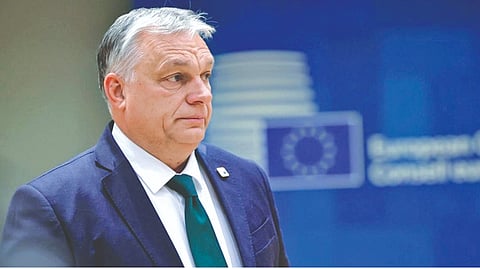

BY KENO VERSECK
WASHINGTON: Hungarian Prime Minister Viktor Orban has already survived several domestic, international, economic and social crises that have threatened to loosen his grip on power. But now he faces the greatest challenge of his 13-year rule. This is why 2023 could become a decisive — perhaps even fateful — year for the politician, whose name is inextricably linked to the rise of illiberalism in Europe.
Hungary is currently in the midst of its most serious economic crisis since the country almost went bankrupt during the international financial meltdown of 2008-09. Its currency, the forint, has plummeted in value in recent months, and inflation now exceeds 20%, plunging a rising number of people into hardship.
Price caps for food and petrol have not been much help so far and have resulted in shortages for the first time since the collapse of socialism in Eastern Europe in 1989.
In the middle of this difficult socioeconomic situation, the European Union decided in December to withhold billions of euros in funds because of concerns about corruption and the rule of law in Hungary. Brussels is now threatening to make even more cuts, or to completely halt all EU payments to Budapest.
In addition, the pro-Russian stance of Orban’s government has made Hungary more isolated than ever within the European Union. It’s the only country in the EU to reject sanctions against Russia, it has refused to allow the transit of weapons shipments to Ukraine through its territory and was reluctant to agree to billions of euros in aid for Kyiv.
“The fact is that the Orban government has never been in as difficult a situation as it is now,” said political scientist Peter Kreko, of Political Capital, a left-wing liberal policy research and consulting institute in Budapest. “You can see it in the opinion polls, which tell us that a growing number of people are dissatisfied, and in the teachers’ protests, which have been going on for months now.”
But, said Kreko, Orban and his government may prove to be resilient. “Orban and his government are still very good at shifting the blame for all crises onto other players, such as the EU or the stock exchange billionaire George Soros,” Kreko told DW. “Orban and his party, Fidesz, still have a very stable electoral base. They have also set up the most centralised political system in the EU. All of this means that it is likely the Hungarian government will weather the storm of this crisis, too.”
Laszlo Csaba, a conservative economist who was once part of an informal group of Orban’s advisers and lectures at the Central European University, told DW that Hungary’s current crisis is primarily a “crisis of the Orban model.”
“This model is built on a policy of cheap money, loose monetary policy and high spending. This is now no longer sustainable,” said Csaba. “Overall, the government’s situation is difficult, but not catastrophic. Hungary is facing recession, but it is not teetering on the brink as it was 15 years ago, during the financial crisis.”
Much in the coming months will depend on whether the European Union pays out funds to Hungary, the second-largest net recipient of EU funds after Poland. In recent years, these funds have accounted for an average 3–4% of the country’s gross national product, roughly corresponding to its annual economic growth.
After months of negotiations, the European Commission decided last year to withhold the payment of 6.3 billion euros ($6.6 billion) to Hungary because of concerns about corruption and the rule of law in the country.
Visit news.dtnext.in to explore our interactive epaper!
Download the DT Next app for more exciting features!
Click here for iOS
Click here for Android